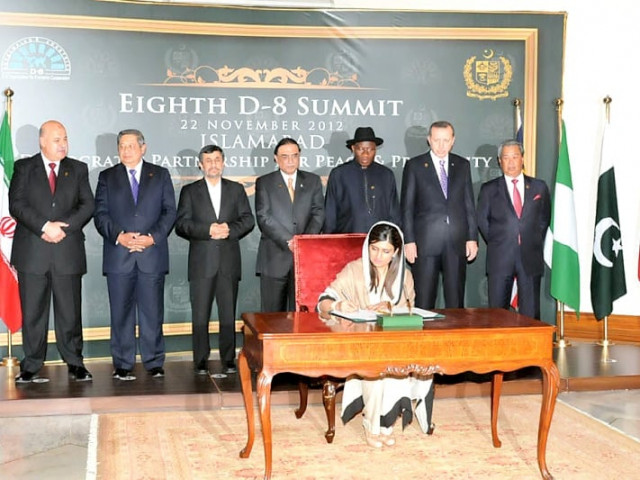From Istanbul to Islamabad: Termed a ‘turning point,’ D-8 summit convenes
Delegates sign D-8 Charter; Iranian president vows to complete Pak-Iran pipeline by 2014, shrugs off US pressure.

From Istanbul to Islamabad: Termed a ‘turning point,’ D-8 summit convenes
Leaders from the Developing Eight (D-8) countries signed on Thursday two landmark documents – the D-8 Charter and the Global Vision – at a rare major international gathering in Pakistan that seeks to safeguard the interests of member states in the global economy.
Terming the move “a turning point for the organisation,” the group issued a joint declaration at the conclusion of the D-8 Summit on Thursday stating, “The adoption of the Global Vision, collectively takes us on a new path of cooperation after we have concluded our mutually beneficial cooperation from Istanbul to Islamabad.”
The Islamabad summit also holds special significance as it coincides with the 15th anniversary of the founding of the D-8 bloc.
The D8 was formed in 1997 to advance development cooperation among the member nations. They comprise Iran, Turkey, Malaysia, Pakistan, Nigeria, Egypt, Bangladesh and Indonesia.
Iranian President Mahmood Ahmedinejad, Indonesian President Susilo Bambang Yudhoyono and Turkish Prime Minister Recep Tayyip Erdogan attended the summit on Thursday amid tight security.
Egyptian President Mohamed Mursi bowed out of the summit at the 11th hour apparently to monitor the truce between Israel and Hamas. The Egyptian vice president arrived in Islamabad to attend the summit instead.
Taking place a day after at least 36 people were killed across the host country in terrorist attacks, the D-8 summit also acknowledged that terrorism was a hurdle to economic progress and prosperity.
Member states also pledged to work in solidarity to confront common challenges including food security, mitigating the impact of national disasters and countering all forms of extremism, which, they said, undermine economic progress and negatively affect the livelihoods of people.
Addressing the summit, President Asif Ali Zardari described terrorism as one of the most serious threats for Pakistan. He said that terrorists, both from Pakistan and abroad, sought to impose their agenda.“We cannot and will not allow Islam to be hijacked and will fight for our values and will fight for the spirit of our great religion that our Holy Prophet (pbuh) gave to us,” he added. The president further said, “We are fighting the terrorists’ dark and destructive vision every day.”

In his speech, Iranian President Ahmedinejad also acknowledged that terrorism was posing a serious threat but hit out at the United States for violating what he called the sovereignty of Iraq, Pakistan and Afghanistan in the name of fighting extremism.
“There is no doubt that the world needs a new world order on the basis of the fundamental principles of justice and humanity,” Ahmedinejad said.
“I don’t think that anybody has any hope that the creators of the current unjust order can play a role in its reformation,” the Iranian leader added in a clear reference to the US.
Defying US threats, he told a news conference that Iran was committed to completing a multibillion dollar gas pipeline project with Pakistan by 2014.
Economic growth
The joint declaration further said that the continuing difficulties faced by the global economy, particularly the Eurozone area, and the impact of the economic and financial crisis, was undermining the ability of the developing countries to achieve their growth potentials. “We underscore the need for better coordination and close engagement between G20 and D-8,” it added.
It welcomed the ratification of the “Agreement on Simplification of Visa Procedures for the Businessmen of the D-8 Member States” by six member states, as well as the ratification of Multilateral Agreement among D-8 member countries on Administrative Assistance in Customs Matters by seven member states.
It also welcomed the ratification of the Preferential Trade Agreement (PTA) by Indonesia, Iran, Malaysia, Nigeria, Pakistan, and Turkey, and its entry into force, and the current efforts towards its implementation.
The D-8 group, with a total population of one billion people, has a combined market value of $1trillion and plans to boost its trade volume to Rs500 billion by 2018.
Published in The Express Tribune, November 23rd, 2012.



















COMMENTS
Comments are moderated and generally will be posted if they are on-topic and not abusive.
For more information, please see our Comments FAQ